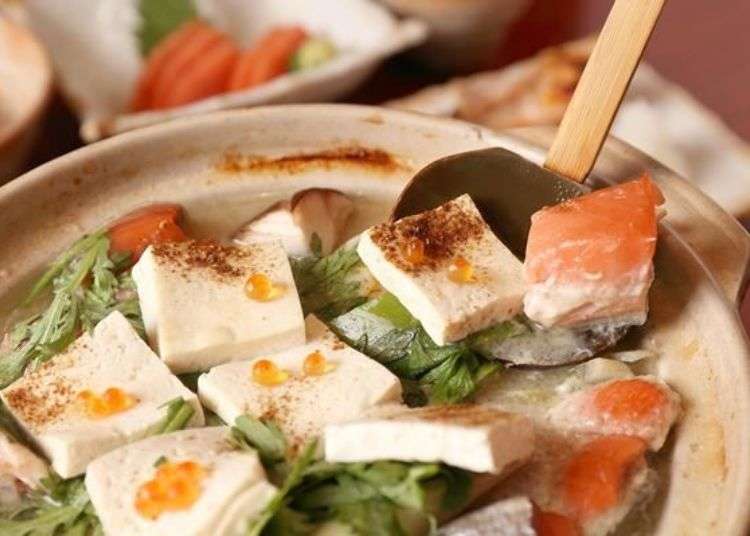
Ishikari nabe (Japanese hot pot) is a local cuisine that represents Hokkaido. It is a miso-based nabe that uses vegetables, salmon or trout.
Kindaitei, a nabe specialty restaurant located in Ishikari City that opened over a century ago, is said to have created this tasty Japanese dish. Kindaitei opened in 1880 and still uses the same building since its conception.
Here you can appreciate the secret family recipe that has been passed down through generations, and also fantastic salmon and trout delicacies. It is worth the trip to taste authentic Ishikari nabe.
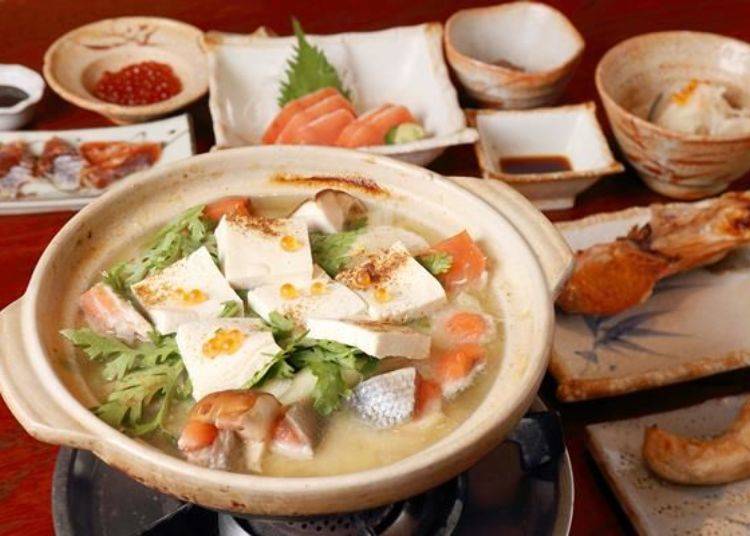
What is Ishikari Nabe, Hokkaido’s Local Cuisine?
Ishikari nabe is a hot pot with ingredients like raw salmon, trout or saw-edged perch, plus onion and cabbage, placed into a soup stock made from kombu kelp and miso.
Ishikari nabe was originally a meal for fishermen in the Ishikari region, where fishermen would chop up the salmon and put it into a large pot of miso soup.
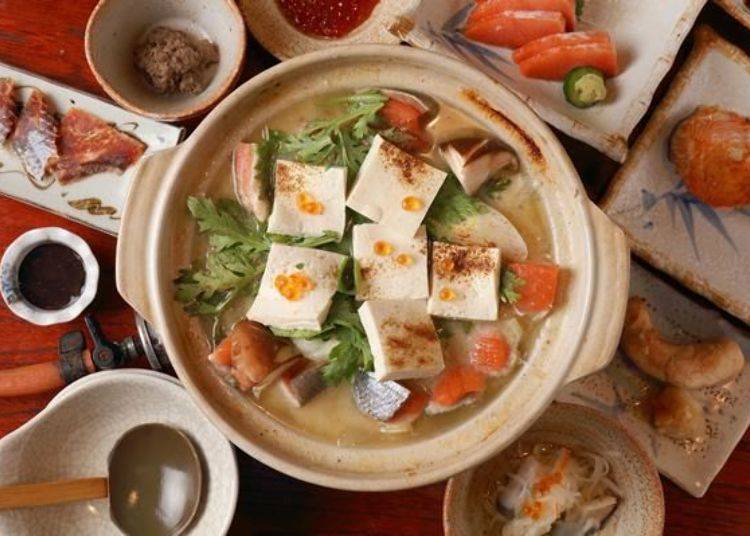
Ishikari nabe is now a local Hokkaido hot pot cuisine. It is served in many restaurants and also a popular home cooking recipe. The flavor and ingredients will vary depending on the shop or household, but the main ingredients of salmon or trout with vegetables in a miso based soup won’t change.
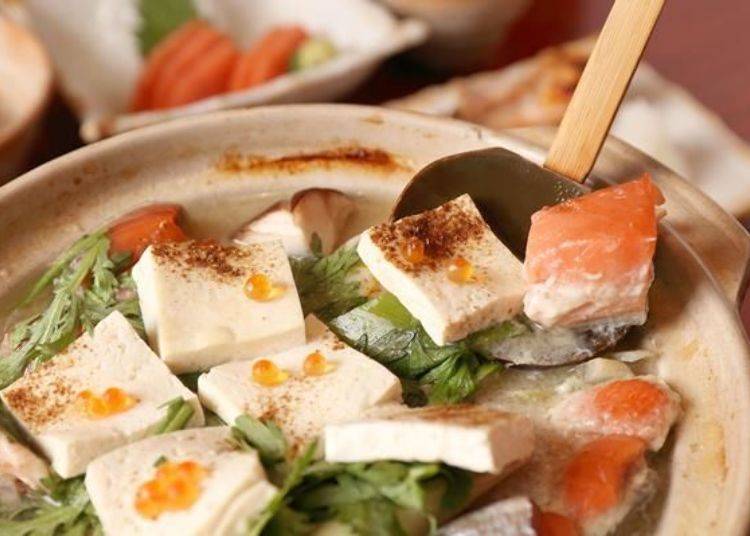
Kindaitei: A Long-Established Salmon Restaurant with a Charming Historical Feel
Kindaitei, a restaurant specializing in salmon and trout dishes, is located near the Ishikari River in Ishikari City, where salmon fishing was conducted during the Meiji Period. From the central area of Sapporo City it takes about 40 minutes by car, and 60 minutes by the Hokkaido Chuo Bus from the Chuo Bus Sapporo Bus Terminal near Sapporo TV Tower.
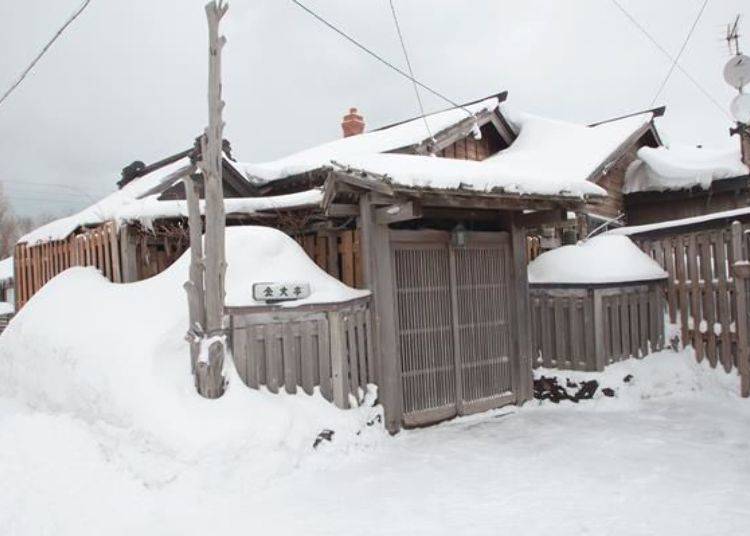
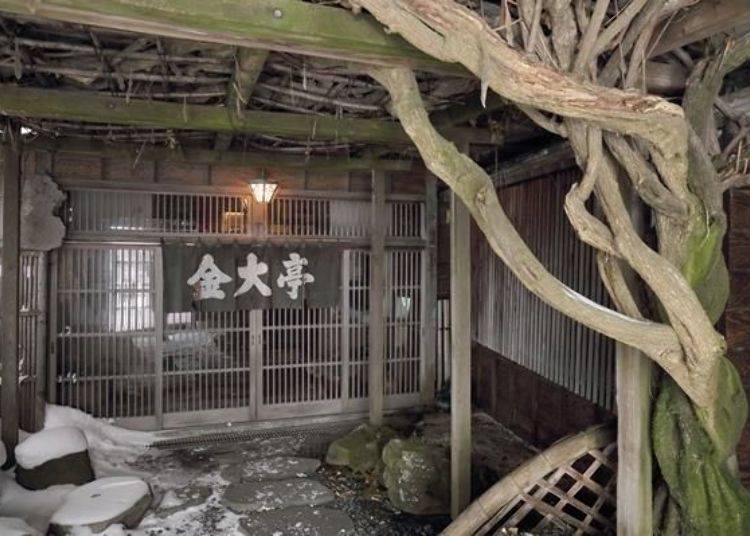
They have been using the same building since they opened. When you open the door you can feel charm from the past! It’s as if you entered a historical movie or theater.
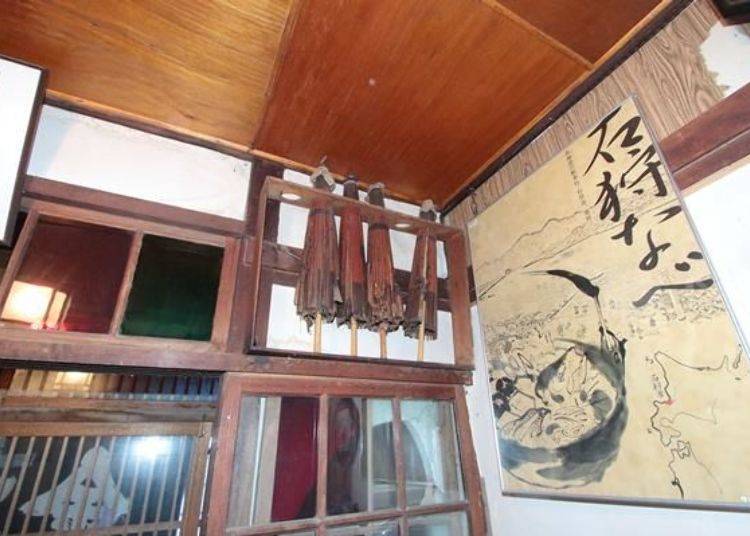
After taking off your shoes and putting on slippers, you can really feel the age of the building with the slightly tilted hallway that creaks.
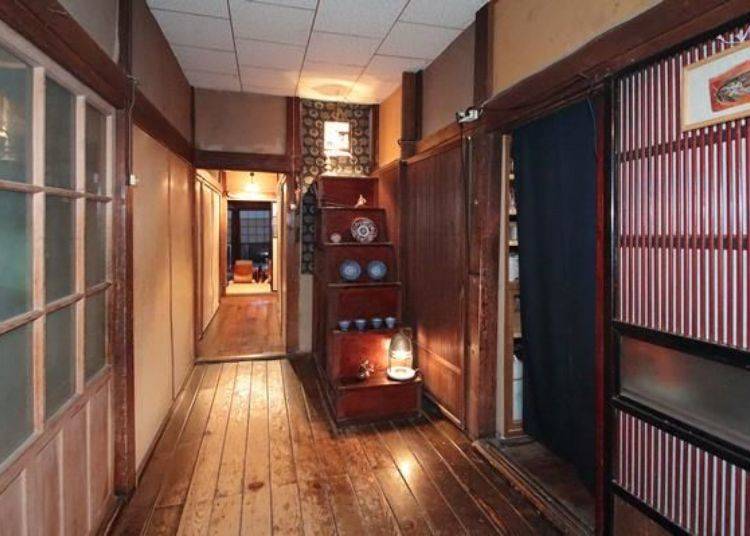

Along the wall, they have period posters and household goods on display. It feels like you entered a history museum instead of a restaurant.
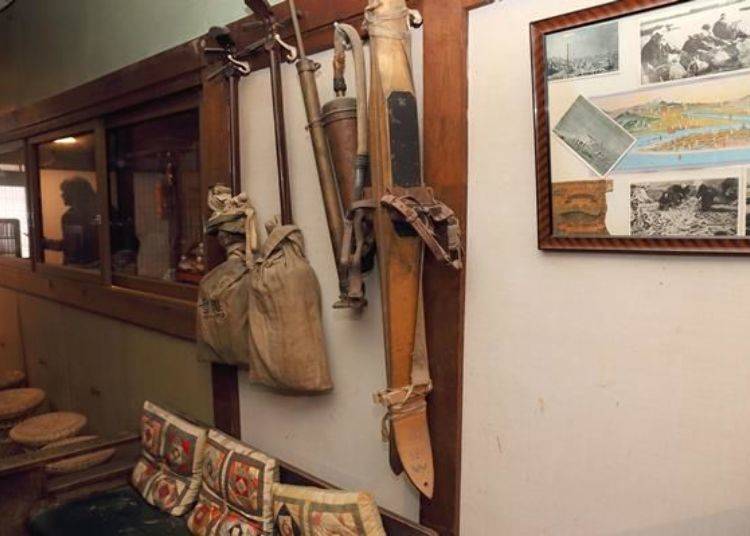
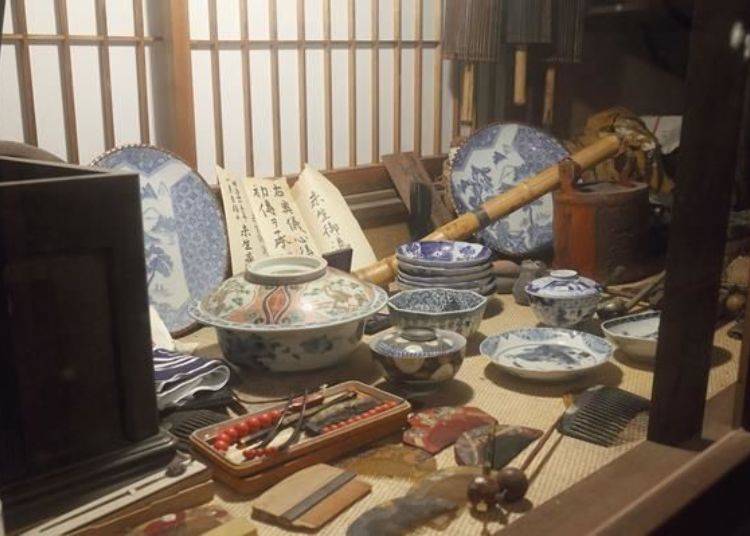
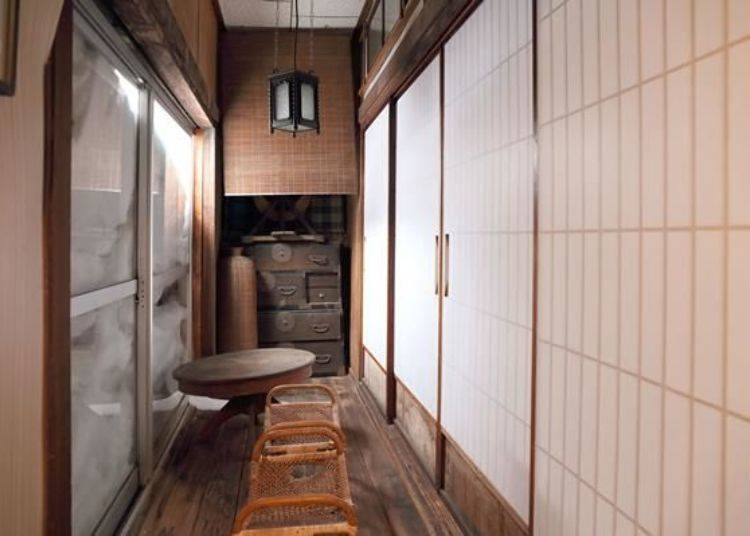
Kindaitei first started when the first Okami (proprietress) Ishiguro Saka moved to Hokkaido from Niigata Prefecture during the Meiji period and established the shop under the name Oishiguro.
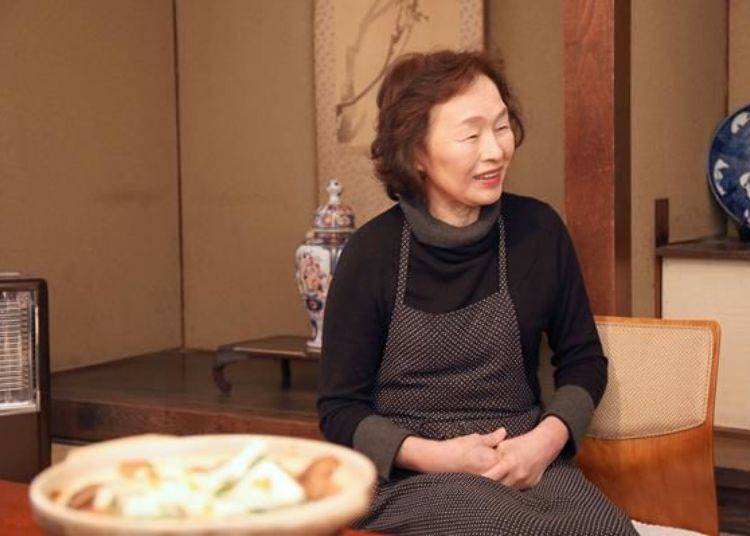
When Kindaitei first opened, they started providing salmon hot pot that fishers would eat to the general public.
During the Taisho period the second-generation Okami, Ishiguro Ko, came up with new salmon dishes such as Hizu-no-Namasu (hizu is the salmon head cartilage and namasu is a vinegar dish with vegetables) and Yaki-Shirako (grilled milt), which lead to using the whole salmon without waste.
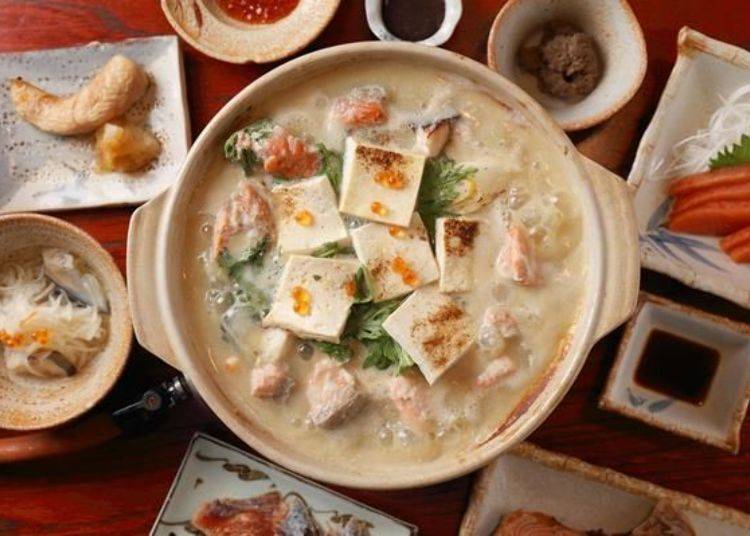
From then on they have passed on the cooking method and started serving Ishikari nabe as salmon nabe.
On Kintaitei's Menu: Hokkaido Salmon and Trout Course Meals
Let’s dig in! The menu at Kintaitei is all course meals that require reservations. They have the following 4 courses and each course comes with a salmon nabe and 6 - 14 dishes.
・Hana Course (7 dishes, 3,000 yen)
・Tsuki Course (9 dishes, 4,000 yen)
・Yuki Course (12 dishes, 5,000 yen)
・Kotobuki Course (15 dishes, 6,000 yen)
*per person price. Reservations start from two people
They also have additional dishes of Fry (800 yen) and Ikura-don (salmon roe rice bowl) (1,500 yen).
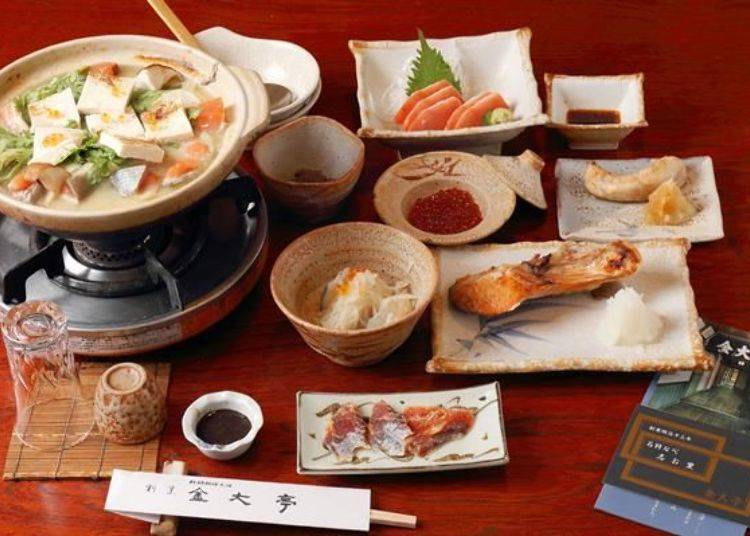
It really is a salmon and trout specialty shop, and all the types used on the menu are from Ishikari.
By the way, the fishing season for salmon is in autumn, and trout is spring. For that reason, from autumn to early spring, they use salmon, and from spring to early autumn, they use trout. However, the menu doesn’t change throughout the year. You can enjoy a salmon or trout meal anytime you come here.
This time we tried the nine dish Tsuki course.
Many Delicious Hokkaido Salmon Dishes
All the seats at Kindaitei are private rooms and they have 6 rooms.

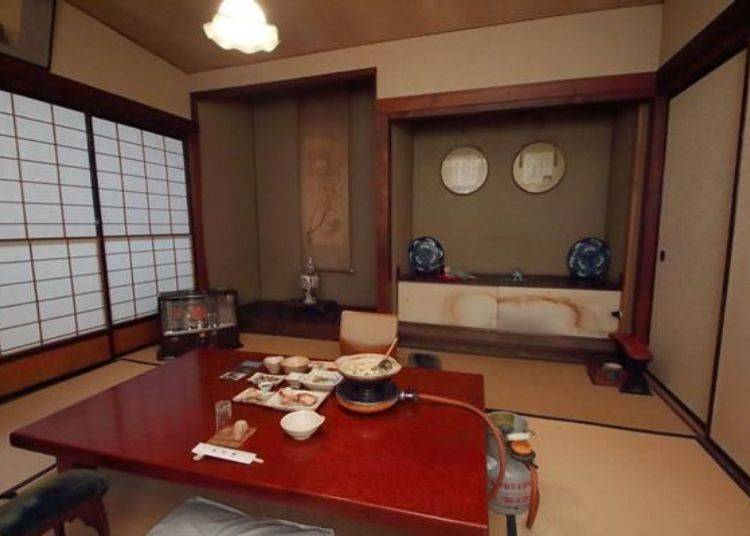
As we entered the room there were few dishes on the table already. As we were seated, the other dishes such as grilled food were served and at the end, the Hokkaido salmon nabe was served.
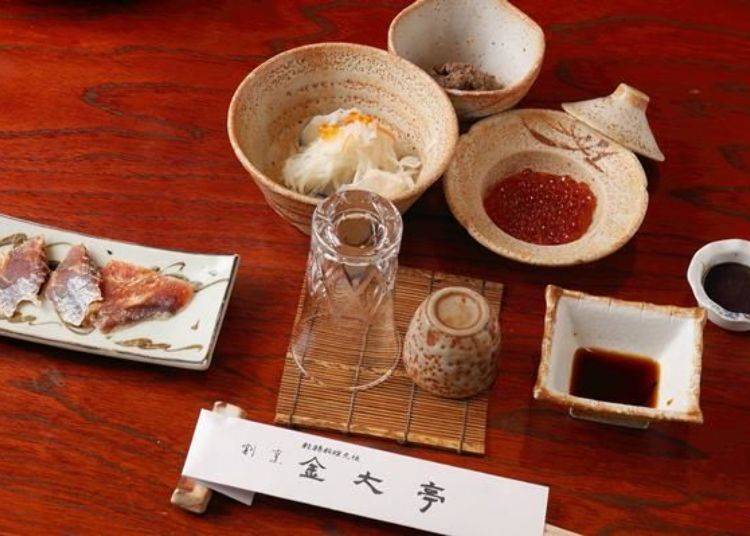
Here are the 8 dishes that are served along with the salmon nabe in the Tsuki course.
First dish: Ikura (salmon roe)
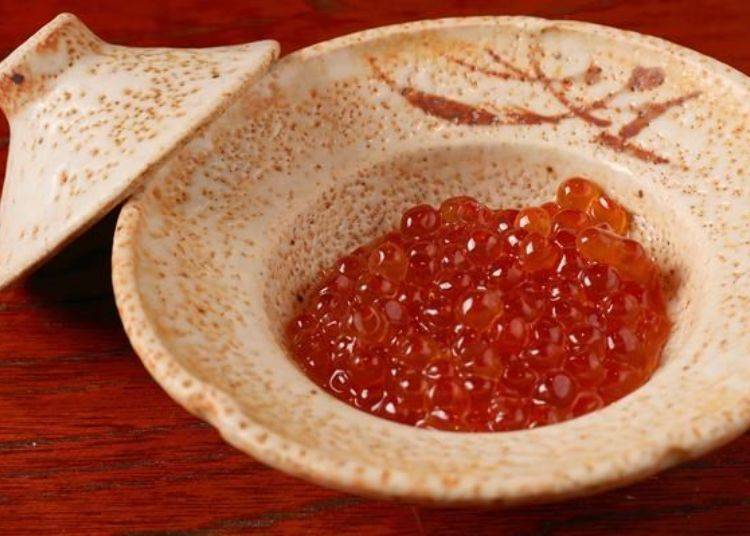
Second dish: Hizu-no-Namasu
The delicate flesh from the front of a salmon is sliced thinly and then fully drained of blood. Then it is pickled and mixed in with daikon radish.
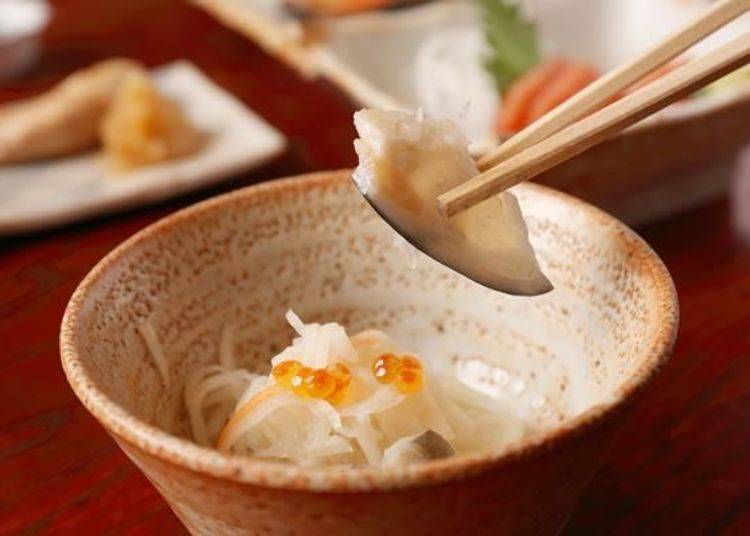
Third dish: Tomoe-Ae
Salmon liver, stomach and gut made into a paste and flavored with sugar and miso.
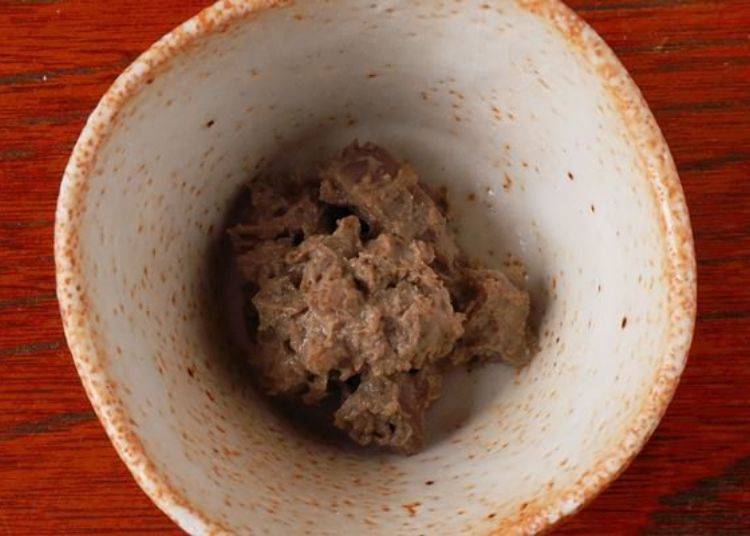
Fourth dish: Mefun-no-Shiokara
Mefun is the intestine along the midrib in areas near the kidney; it is dark red with blood. These ingredients are then made into a shiokara (fermented with salt).
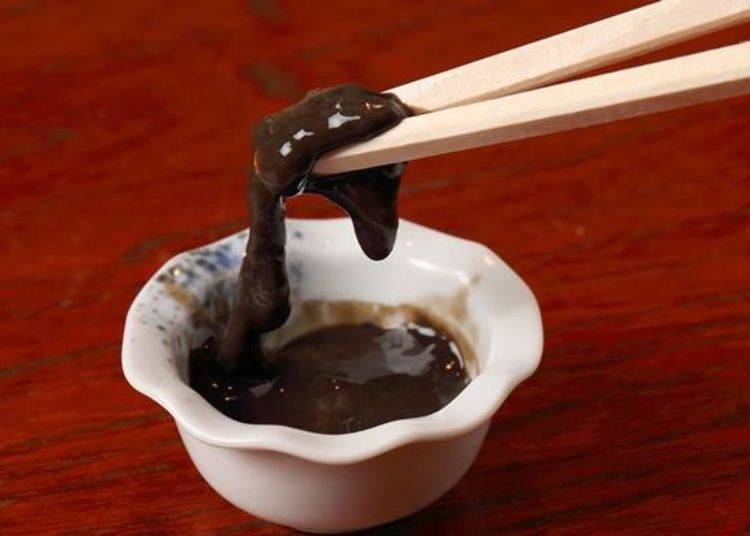
Fifth dish: Kanshiobiki
This traditional preservative food that Okami Ishighuro proudly boasts, they use the same cooking method from the Edo period.
They preserve the salmon caught in October in salt and then let it sit in ice-cold water in January to remove the salt, which takes about a week to 10 days. Then it is hanged to dry until May. The dish on the table is salmon that was caught in autumn last year.
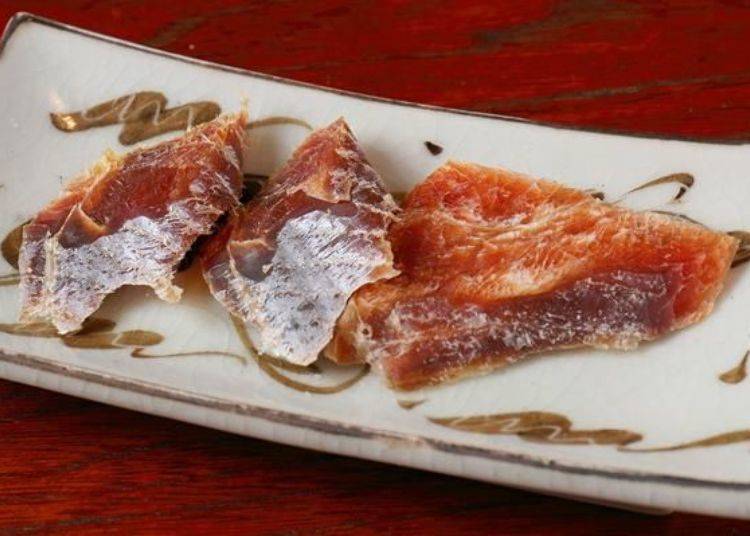
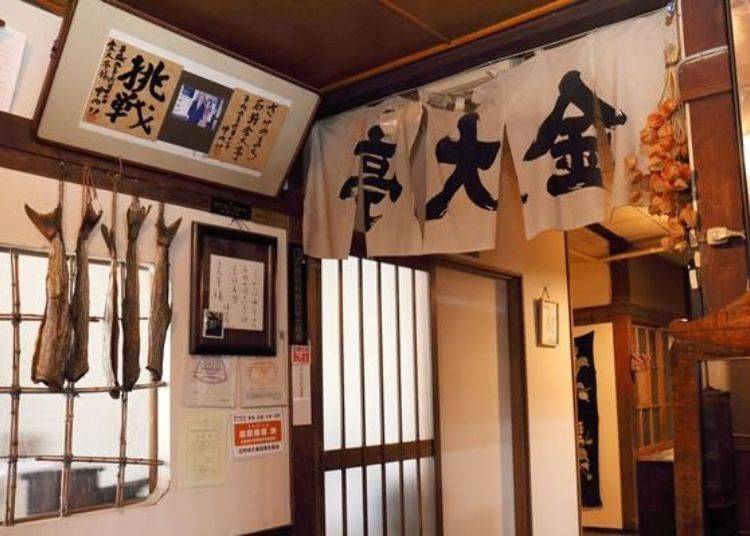
As we were eating the first 5 dishes, the following dishes were served in sequence.
Sixth dish: Grilled Salmon
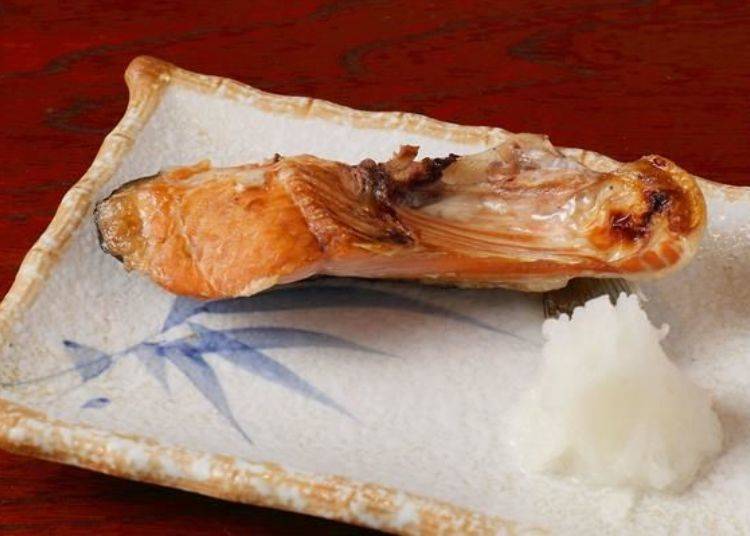
Seventh dish: Grilled Shirako
Salt flavored salmon shirako (milt) grilled with a side of grated daikon radish.
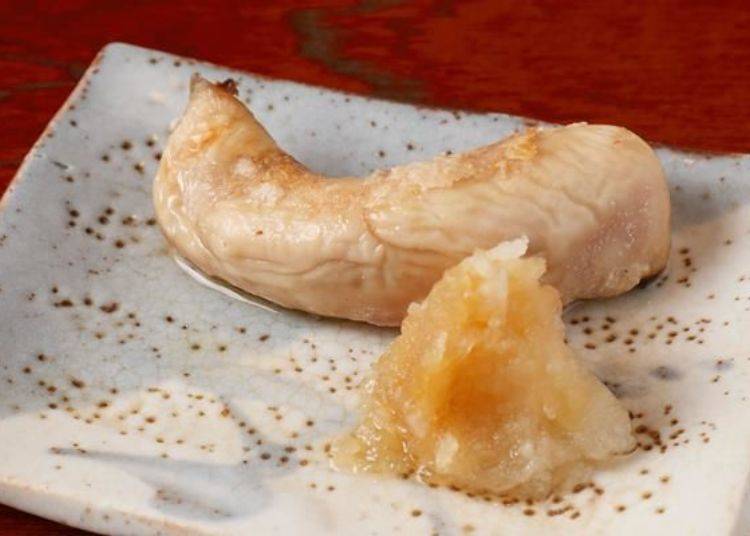
Eighth dish: Ruibe
Ruibe is salmon sashimi that was frozen and then partially defrosted. When the surface is defrosted slightly, it is ready to eat with soy sauce and wasabi.
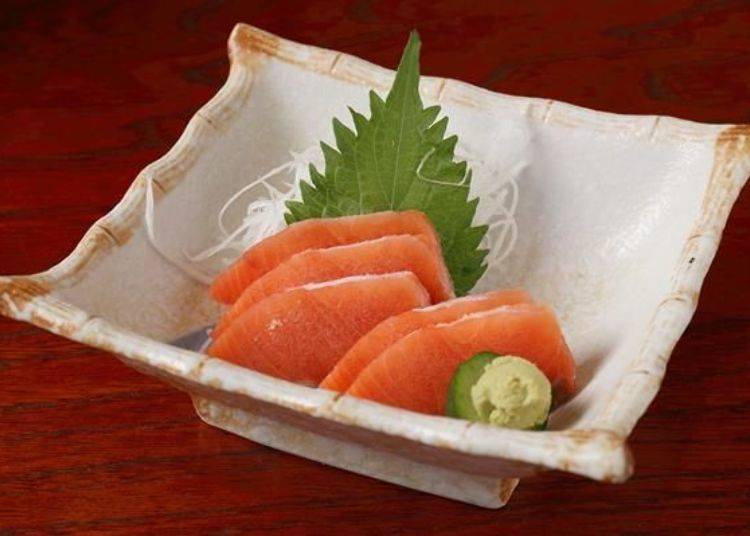
The Original Ishikari Nabe has a Deep and Mild Flavor
As we are eating the course dishes, the Hokkaido salmon nabe is served. Time for the main dish.
At Kindaitei, cabbage and onions are stewed in a kombu stock base with white miso. Then chunks of salmon, shungkiu (edible chrysanthemum), green onion, konjac and tofu with Japanese pepper is placed in the nabe.
The salmon is from Ishikari and the vegetables are also from Ishikari and nearby regions.
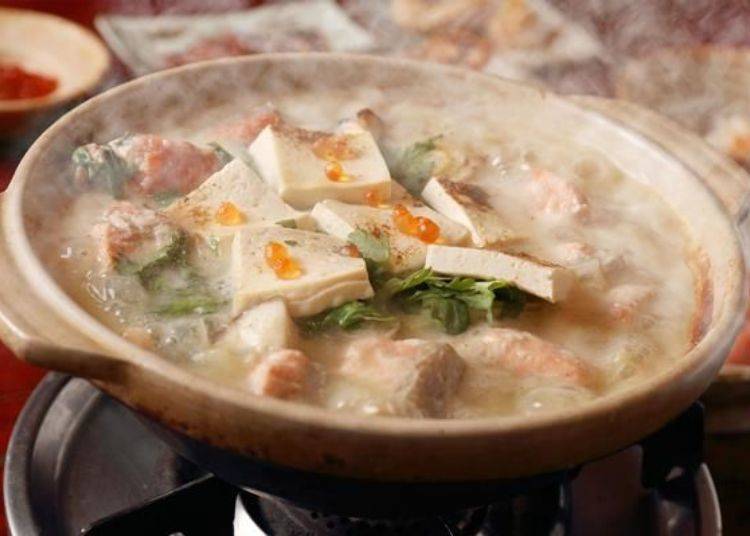
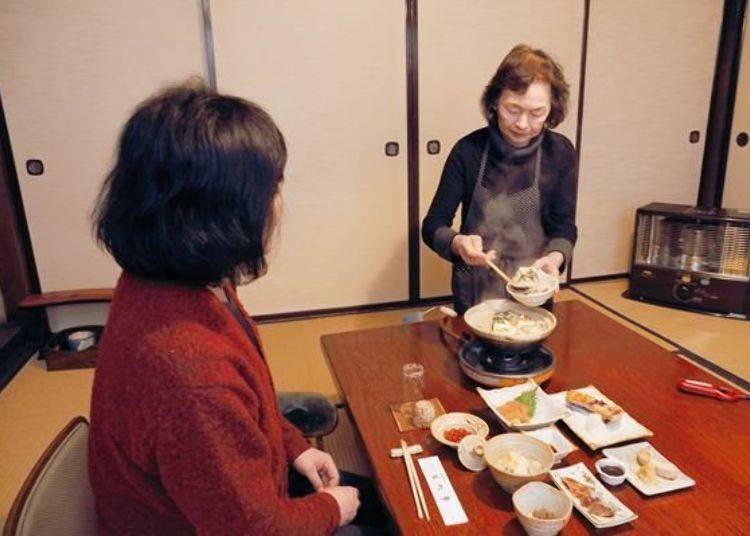
First, we tasted the soup.
The mixture of sweetness from the vegetables, kombu stock, and umami of the salmon creates a mild flavor. Surprisingly you can’t taste the saltiness or the rich flavor of miso; it is more of an elegant hint.
The sansho pepper gives that nice tingly feeling but also helps to suppress the smell of raw salmon and provide a more mild taste. You can really feel and taste the various ingredients combine in the pot.
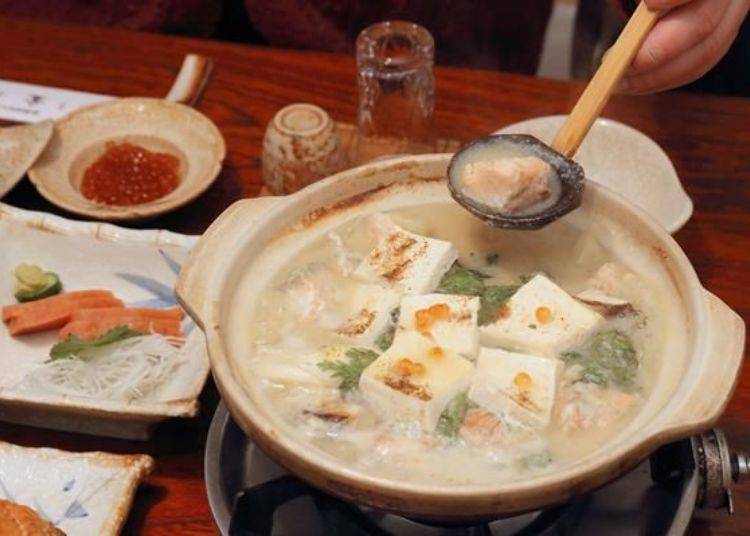
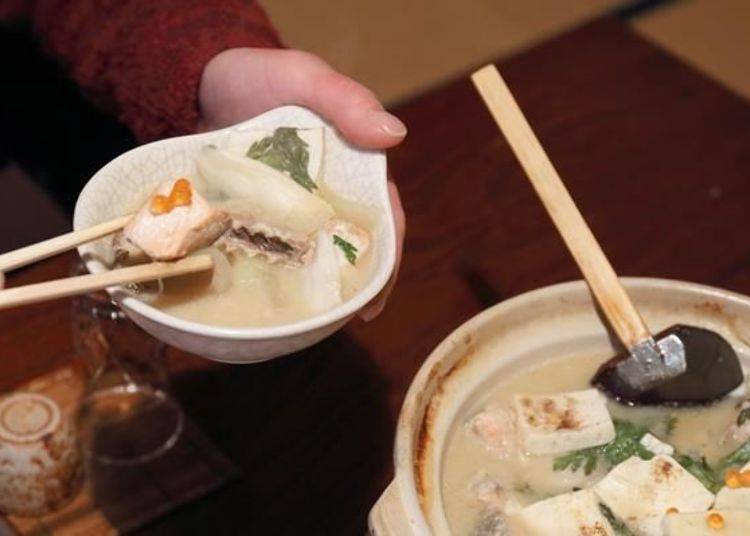
The salmon has nice light flavor. The vegetables are sweet and delicious. It is filling but, you can keep eating it. We ate the whole thing including all the soup!
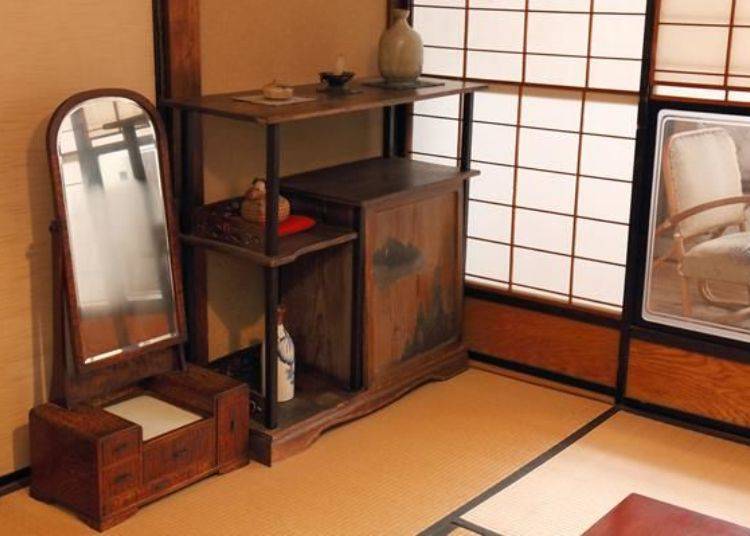
For over 130 years, Kindaitei has been serving Hokkaido hot pot, and you can appreciate their dedication. It’s really delicious! The flavor and charming aesthetics make me want to come again.
It is well worth the one hour travel time from Sapporo. The great originator of Ishikari nabe, a true legend. Make sure you experience this if you have the chance!
-
Kindaitei金大亭
- Address Shinmachi 1 Ishikari-shi, Hokkaido
Hours: 11:00 AM ~ 9:00 PM (L.O. 7:00 p.m.) *requires reservations
Closed: unscheduled
0133-62-3011
- Area
- Category
*Prices and options mentioned are subject to change.
*Unless stated otherwise, all prices include tax.
Popular Tours & Activitiess
Recommended places for you
-

LakeAkan
Rivers, Lakes & Canyons
Abashiri
-
Appealing

Mt. Hakodate Observatory
Forests & Mountains
Hakodate
-
Appealing

Shiroi Koibito Park
Theme Parks
Sapporo / Chitose
-
Appealing

Sapporo Ramen Yokocho
Ramen
Sapporo / Chitose
-
Appealing

Rukku and Uohei
Izakaya
Sapporo / Chitose
-

Niseko Village Ski Resort
Skiing & Snowboarding
Niseko / Rusutsu
-
Ad

Smart Ways to Avoid Crowds and Enjoy a Safe, Comfortable Trip to Noboribetsu Onsen
-

Explore Japan in 7 Days: The Ultimate Local Rail Adventure with the Hokkaido & East Japan Pass
by: Guest Contributor
-

7 Iconic Hokkaido locations that will make your Instagram shine
by: Himanshi Shah
-

BIGGEST SALE ALERT! SATUDORA Tax-Free Winter Sale: Stack Coupons for Massive Savings!
by: Guest Contributor
-
Ad

Welcome to Sapporo! Here’s How to Expore the Ciy Like a Local
-
Ad

Smart Ways to Avoid Crowds and Enjoy a Safe, Comfortable Trip to Otaru.
-

Complete Guide to Buying Japanese Medicine in Japan: Phrases and Vocabulary You Need to Know
-

10 Important Japanese Phrases to Know Before You Enter a Japanese Convenience Store
by: Teni Wada
-

Where to Stay in Noboribetsu Onen: 6 Ryokan Hotels in Hokkaido's Spa Wonderland
by: Masakazu Yoshida
-

Day Trip from Sapporo to Otaru: Access, Itinerary & Food Guide
by: Guest Contributor
-

Hakodate 2-Day Itinerary for Exploring Japan's Foodie North!
-

(Video) Walking Tour along Narita Omotesando - Quaint Historical Village near Narita Airport!
by: Victor Gonzalez
- #best sushi hokkaido
- #things to do hokkaido
- #best ramen sapporo
- #what to bring to japan
- #new years in tokyo
- #what to buy in ameyoko
- #japanese nail trends
- #what to do in odaiba
- #onsen tattoo friendly tokyo
- #daiso
- #best sweets otaru
- #japanese fashion culture
- #best nature furano
- #japanese convenience store snacks
- #best japanese soft drinks












